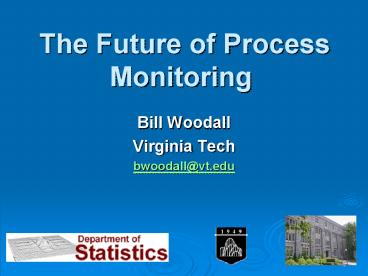The Future of Process Monitoring - PowerPoint PPT Presentation
1 / 13
Title:
The Future of Process Monitoring
Description:
Stoumbos, Z. G., Reynolds, M. R., Jr., Ryan, T. P., and Woodall, W. H. (2000) ... Health-related Monitoring and Public Health Surveillance ... – PowerPoint PPT presentation
Number of Views:82
Avg rating:3.0/5.0
Title: The Future of Process Monitoring
1
The Future of Process Monitoring
- Bill Woodall
- Virginia Tech
- bwoodall_at_vt.edu
2
Woodall, W. H., and Montgomery, D. C. (1999),
Research Issues and Ideas in Statistical Process
Control, Journal of Quality Technology, 31,
376-386. http//filebox.vt.edu/users/bwoodall/Res
earch20Issues20and20Ideas.pdf Stoumbos, Z.
G., Reynolds, M. R., Jr., Ryan, T. P., and
Woodall, W. H. (2000), The State of Statistical
Process Control as We Proceed into the 21st
Century, Journal of the American Statistical
Association, 95, 992-998.
3
Topics
- Profile Monitoring
- Health-related Monitoring and Public Health
Surveillance - Other areas Change point analysis, multi-stage
processes, and the effect of estimation error.
4
Profile MonitoringThe
objective is to monitor functional data over
time. Woodall, W. H., Spitzner, D. J.,
Montgomery, D. C., and Gupta, S. (2004). Using
Control Charts to Monitor Process and Product
Quality Profiles, Journal of Quality Technology
36, 309-320. http//filebox.vt.edu/users/b
woodall/WOODALL20et20al.pdf
5
Linear Profile Data Framework
response (Y)
n10
explanatory variable (X)
j k
j 2
j 1
time
j 1,2,,k sample profiles ngt2 observations in
each profile
6
Example Vertical Board Density Profile Data from
Walker and Wright (JQT, 2002)We have 24
profiles of vertical density, each profile
consists of n 314 measurements.
7
Two Standard Approaches
- Fit a parametric model to each profile and
monitor each parameter with a separate chart or
use a multivariate chart based on the vectors of
parameter estimators. - Smooth the profile data at each time period and
control chart various metrics designed to detect
specified changes in profile shape.
8
Why use wavelets to model profiles?
- Parametric models or nonparametric smoothing
combined with metrics are far easier to use. - Wavelets are hard to understand.
- Dimensionality can still be high.
- Wavelet coefficients may be not be interpretable.
9
Healthcare Monitoring Woodall, W. H.
(2006), Use of Control Charts in Health Care
Monitoring and Public Health Surveillance (with
discussion), To appear in Journal of Quality
Technology. http//filebox.vt.edu/use
rs/bwoodall/JQT20Proofs.pdf
- David Spiegelhalter and Olivia Grigg, Cambridge
- James Benneyan, Northeastern University and
Institute for Healthcare Improvement - M.A. Mohammed, University Hospital of Birmingham,
UK - Stefan Steiner, University of Waterloo
- Howard Burkom, Johns Hopkins
- Jim Lucas, Consultant, and Rochelle Watkins,
Curtin University of Technology, Australia
10
Healthcare applications involve
- More attribute data, often with 100 inspection
and rare events - More time-between-events data
- Risk-adjustment
- Over-dispersion and multiple testing
- Spatial data and prospective detection of
clusters
11
A very useful referenceLawson, A. B. and
Kleinman, K. (2005). Spatial Syndromic
Surveillance for Public Health, John Wiley
Sons, Inc., New York, NY.
12
Other Areas
- Multi-stage Processes
- Change-point Methods
- Effect of Parameter Estimation
- Jensen, W. A., Jones-Farmer, L. A., Champ,
C. W., and Woodall, W. H. (2006), Effects of
Parameter Estimation on Control Chart
Performance A Literature Review, To appear in
the Journal of Quality Technology. - http//filebox.vt.edu/users/bwoodall/Effec
t20of20Parameter20Estimation.pdf
13
There are many important research and application
opportunities in profile- and health-related
monitoring.































